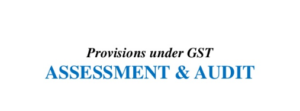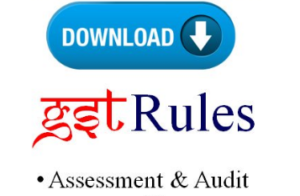ASSESSMENT AND AUDIT
Check Rules of Assessment & Audit under GST Regime. Recently GST Law 2017 is release by CBEC. In addition, CBEC Release GST Assessment Rules 2017 & GST Audit Rules 2017. So here we provide Latest GST Assessment & Audit Rules. Also, we present you — provisional assessment, scrutiny of returns, assessment in certain cases, audit, special audit in all new GST regime. Furthermore, you will find and can download various important forms. Hence, this article provide you basic provisions relating assessment and audit rules 2017.
 ASSESSMENT & AUDIT RULES AS PER GST BILL 2017 CONTAIN THE FOLLOWING PROVISIONS :—
ASSESSMENT & AUDIT RULES AS PER GST BILL 2017 CONTAIN THE FOLLOWING PROVISIONS :—
1. Provisional Assessment
(1) Every registered person requesting for payment of tax on a provisional basis in accordance with the provisions of sub-section (1) of section 60 shall furnish an application along with the documents in support of his request, electronically, in FORM GST ASMT-01 on the Common Portal, either directly or through a Facilitation Centre notified by the Commissioner.
(2) The proper officer may, on receipt of the application under sub-rule (1), issue a notice in FORM GST ASMT-02 requiring the registered person to furnish additional information or documents in support of his request and the applicant shall file a reply to the notice in FORM GST ASMT-03, and may appear in person before the said officer if he so desires.
(3) The proper officer shall issue an order in FORM GST ASMT-04, allowing payment of tax on a provisional basis indicating the value or the rate or both on the basis of which the assessment is allowable on a provisional basis and the amount for which the bond put into effect and security furnished not exceeding twenty five per cent of the amount covered under the bond.
(4) The registered person shall execute a bond in accordance with the provisions of sub-section (2) of section 60 in FORM GST ASMT-05 along with a security in the form of a bank guarantee for an amount as determined under sub-rule (3).
Provide that a bond furnished to the proper officer under the Central/State Goods and Services Tax Act or Integrated Goods and Services Tax Act suppose that a bond furnished under the provisions of this Act and the rules made there under.
Explanation — For the purposes of this rule, the term “amount” shall include the amount of integrated tax, central tax, State tax or Union territory tax and cess payable in respect of the transaction.
(5) The proper officer shall issue a notice in FORM GST ASMT-06, calling for information and records required for finalization of assessment under sub-section (3) of section 60 and shall issue a final assessment order, specifying the amount payable by the registered person or the amount refundable, if any, in FORM GST ASMT-07.
(6) The applicant may file an application in FORM GST ASMT-08 for release of security furnished under sub-rule (4) after issue of order under sub-rule (5).
(7) The proper officer shall release the security furnished under sub-rule (4), after ensuring that the applicant has paid the amount specified in sub-rule (5) and issue an order in FORM GST ASMT-09 within a period of seven working days from the date of receipt of the application under sub-rule (6).
2. Scrutiny of returns
(1) Where any return furnished by a registered person is selected for scrutiny, the proper officer shall scrutinize the same in accordance with the provisions of section 61 with reference to the information available with him, and in case of any discrepancy, he shall issue a notice to the said person in FORM GST ASMT-10, informing him of such discrepancy and seeking his explanation thereto within such time, not exceeding thirty days from the date of service of the notice or such further period as may be permitted by him and also, where possible, quantifying the amount of tax, interest and any other amount payable in relation to such discrepancy.
(2) The registered person may accept the discrepancy mentioned in the notice issued under sub-rule (1), and pay the tax, interest and any other amount arising from such discrepancy and inform the same or furnish an explanation for the discrepancy in FORM GST ASMT-11 to the proper officer.
(3) Where the explanation furnished by the registered person or the information submitted under sub-rule (2) is if acceptable, the proper officer shall inform him accordingly in FORM GST ASMT-12.
3. Assessment in certain cases
(1) The order of assessment made under sub-section (1) of section 62 shall be issued in FORM GST ASMT-13.
(2) The proper officer shall issue a notice to a taxable person in accordance with the provisions of section 63 in FORM GST ASMT-14 containing the grounds on which the assessment is proposed to be made on best judgment basis and after allowing a time of fifteen days to such person to furnish his reply, if any, pass an order in FORM GST ASMT-15.
(3) The order of summary assessment under sub-section (1) of section 64 shall be issued in FORM GST ASMT-16.
(4) The person referred to in sub-section (2) of section 64 may file an application for withdrawal of the summary assessment order in FORM GST ASMT-17.
(5) The order of withdrawal or, as the case may be, rejection of the application under sub-section (2) of section 64 shall be issued in FORM GST ASMT-18.
4. Audit
 (1) The period of audit to be conducted under sub-section (1) of section 65 shall be a financial year or multiples thereof.
(1) The period of audit to be conducted under sub-section (1) of section 65 shall be a financial year or multiples thereof.
(2) Where it is decided to undertake the audit of a registered person in accordance with the provisions of section 65, the proper officer shall issue a notice in FORM GST ADT-01 in accordance with the provisions of sub-section (3) of the said section.
(3) The proper officer authorised to conduct audit of the records and books of account of the registered person shall, with the assistance of the team of officers and officials accompanying him, verify the documents on the basis of which the books of account are maintained and the returns and statements furnished under the Act and the rules made there under, the correctness of the turnover, exemptions and deductions claimed, the rate of tax applied in respect of supply of goods or services or both, the input tax credit availed and utilized, refund claimed, and other relevant issues and record the observations in his audit notes.
(4) The proper officer may inform the registered person of the discrepancies noticed, if any, as observations of the audit and the said person may file his reply and the proper officer shall finalise the findings of the audit after due consideration of the reply furnished.
(5) On conclusion of the audit, the proper officer shall inform the findings of audit to the registered person in accordance with the provisions of sub-section (6) of section 65 in FORM GST ADT-02.
5. Special Audit
(1) Where special audit is required to be conducted in accordance with the provisions of section 66, the officer referred to in the said section shall issue a direction in FORM GST ADT-03 to the registered person to get his records audited by a chartered accountant or a cost accountant specified in the said direction.
(2) On conclusion of special audit, proper officer shall inform to the registered person of the findings of special audit in FORM GST ADT-04.
 Under GST, every registered taxable person shall assess the taxes payable by them on their own, and so that furnish a return for each tax period. An assessee can request the officer for provisional assessment if he is unable to determine value or rate of tax in addition. As a result, the proper officer can allow the assessee to pay tax on a provisional basis at a rate or a value specified by him. The proper officer can scrutinize the return to verify its correctness rather. Hence, it is a pre-adjudication process. Therefore, the officer will ask for explanations on any discrepancies noticed in the returns.
Under GST, every registered taxable person shall assess the taxes payable by them on their own, and so that furnish a return for each tax period. An assessee can request the officer for provisional assessment if he is unable to determine value or rate of tax in addition. As a result, the proper officer can allow the assessee to pay tax on a provisional basis at a rate or a value specified by him. The proper officer can scrutinize the return to verify its correctness rather. Hence, it is a pre-adjudication process. Therefore, the officer will ask for explanations on any discrepancies noticed in the returns.
The various GST ASMT FORMS are available here below:
Further, you can download the various GST ADT FORMS from link given below:
In conclusion, audit under GST is the examination of records, the taxable person maintains.
- To verify the correctness of information declared,
- taxes paid and
- to assess the compliance with the provisions of GST
- assessment and audit rules provide the base.
Like the present indirect tax system, GST also provides for self-assessment to facilitate easy compliance and payment of taxes. The GST Model Law also explains the notices and the demand and recovery provisions when the tax person does not pay/short paid and does not file returns.
